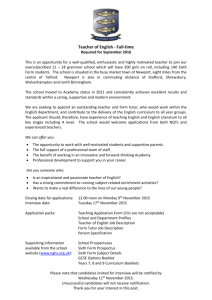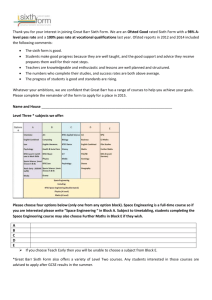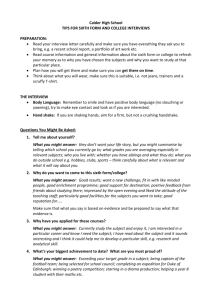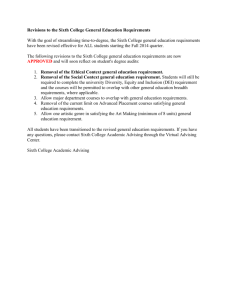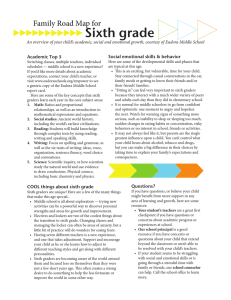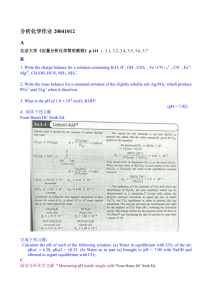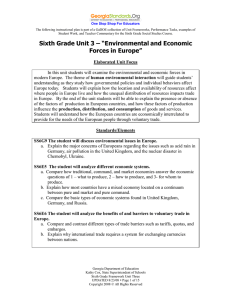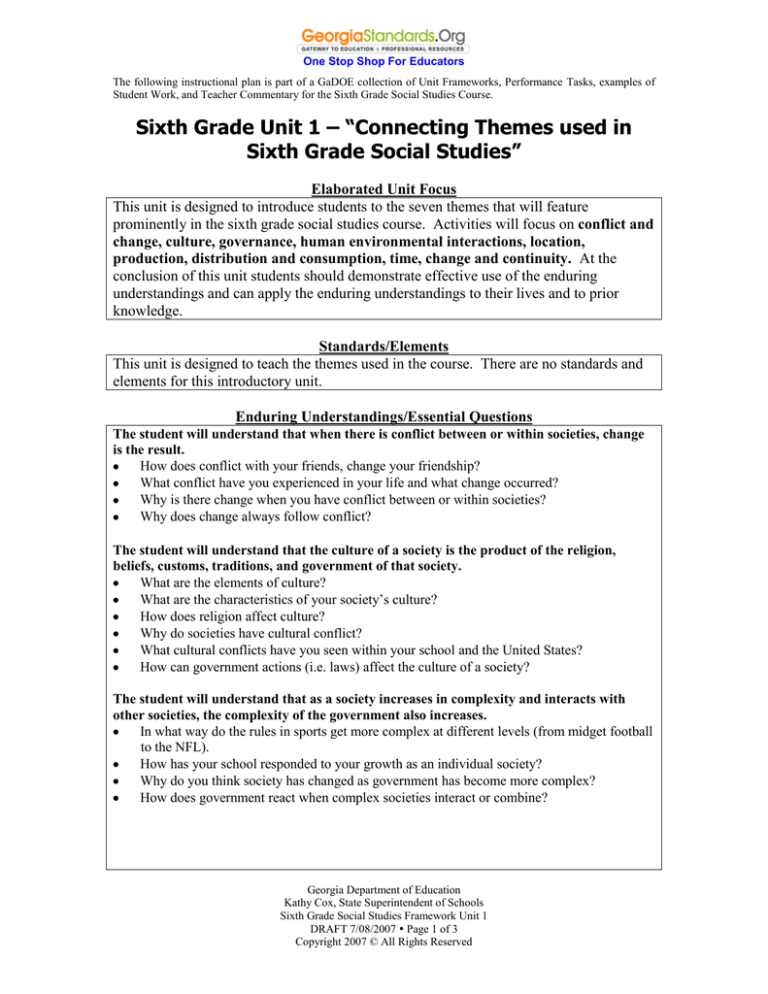
One Stop Shop For Educators
The following instructional plan is part of a GaDOE collection of Unit Frameworks, Performance Tasks, examples of
Student Work, and Teacher Commentary for the Sixth Grade Social Studies Course.
Sixth Grade Unit 1 – “Connecting Themes used in
Sixth Grade Social Studies”
Elaborated Unit Focus
This unit is designed to introduce students to the seven themes that will feature
prominently in the sixth grade social studies course. Activities will focus on conflict and
change, culture, governance, human environmental interactions, location,
production, distribution and consumption, time, change and continuity. At the
conclusion of this unit students should demonstrate effective use of the enduring
understandings and can apply the enduring understandings to their lives and to prior
knowledge.
Standards/Elements
This unit is designed to teach the themes used in the course. There are no standards and
elements for this introductory unit.
Enduring Understandings/Essential Questions
The student will understand that when there is conflict between or within societies, change
is the result.
How does conflict with your friends, change your friendship?
What conflict have you experienced in your life and what change occurred?
Why is there change when you have conflict between or within societies?
Why does change always follow conflict?
The student will understand that the culture of a society is the product of the religion,
beliefs, customs, traditions, and government of that society.
What are the elements of culture?
What are the characteristics of your society’s culture?
How does religion affect culture?
Why do societies have cultural conflict?
What cultural conflicts have you seen within your school and the United States?
How can government actions (i.e. laws) affect the culture of a society?
The student will understand that as a society increases in complexity and interacts with
other societies, the complexity of the government also increases.
In what way do the rules in sports get more complex at different levels (from midget football
to the NFL).
How has your school responded to your growth as an individual society?
Why do you think society has changed as government has become more complex?
How does government react when complex societies interact or combine?
Georgia Department of Education
Kathy Cox, State Superintendent of Schools
Sixth Grade Social Studies Framework Unit 1
DRAFT 7/08/2007 Page 1 of 3
Copyright 2007 © All Rights Reserved
One Stop Shop For Educators
The following instructional plan is part of a GaDOE collection of Unit Frameworks, Performance Tasks, examples of
Student Work, and Teacher Commentary for the Sixth Grade Social Studies Course.
The student will understand that humans, their society, and the environment affect each
other.
How does a society adapt to its environment? (i.e. foods you eat, clothes you wear, jobs,
etc.)
Why would a society change its environment?
What are the consequences (positive and negative) of human environment interaction?
How have you experienced human environment interaction?
The student will understand that location affects a society’s economy, culture, and
development.
What affects how your family makes earns income?
Contrast your lifestyle (i.e.- jobs, house, entertainment) depending on where in Georgia you
currently live or where in the United States/World you have lived?
How might location affect the economy, culture, and development where you live?
The student will understand that the movement or migration of people and ideas affects all
societies.
What causes families to move?
What causes large groups of people to move?
What are the positive/negative consequences of moving?
How can society be affected by people moving from place to place?
The student will understand that the production, distribution, and consumption of
goods/services produced by the society are affected by the location, customs, beliefs, and
laws of the society.
What are the components of an economy?
What influences an economy?
How are items that you buy produced, distributed, and consumed?
How is the economy of our area affected by location, customs, beliefs, and laws?
The student will understand that while change occurs over time, there is continuity to the
basic structure of that society.
What in your life has changed but remained the same?
How can a society change but basic components remain the same over a period of
time?
Why might a society remain the same even if there is change over time?
*NOTE: The balanced assessment plan included in this unit is presented as a series of
suggested activities. It is not expected that the teacher complete all assessments for a
successful unit.
Georgia Department of Education
Kathy Cox, State Superintendent of Schools
Sixth Grade Social Studies Framework Unit 1
DRAFT 7/08/2007 Page 2 of 3
Copyright 2007 © All Rights Reserved
One Stop Shop For Educators
The following instructional plan is part of a GaDOE collection of Unit Frameworks, Performance Tasks, examples of
Student Work, and Teacher Commentary for the Sixth Grade Social Studies Course.
Balanced Assessment Plan
Description of Assessment
Socratic questioning about how students relate to themes
personally. At the end of questioning students respond to the
prompt “How (insert theme) relates to my life.” Teacher may
use all the themes or select certain ones for the prompt.
Create a culture collage depicting their own culture. Students
can use magazine pictures, draw pictures, and use words to
describe their own culture. Students will share their culture’s
collages within small groups.
Choose a product (good). Trace the item from raw material to
the point that it ends up in your home. Include production,
distribution, and sale of the product. Design a flow chart and
provide a written explanation for each step of the process.
Standard/
Type of
Element
Assessment
No
Dialogue and
specific
Discussion
standard. Constructed
Response
SelfAssessment
Self –
Assessment
Constructed
Response
Dialogue and
Discussion
Informal
Observation
Dialogue and
Discussion
Constructed
Response
Sample Performance Task (attach rubric)
*No culminating performance task for this unit.
Map and Globe Skills:
Information Processing Skills:
Resources for Unit
http://www.gpb.org What is Culture?- This United Streaming video clip describes the
components of culture.
Read Aloud: People by Peter Spier. This book describes all the aspects of culture and
helps students appreciate the diversity which exists in the world.
The main resources in this unit are the students’ own experiences as they relate their
world to the connecting themes.
*This unit was created by Pam Knauer, Shaun Owen, and Kelli Smith with additional
input from Dr. Bill Cranshaw, Chris Cannon, and Marlo Mong. It was approved by the
Social Studies Advisory Council 7/06/07.
Georgia Department of Education
Kathy Cox, State Superintendent of Schools
Sixth Grade Social Studies Framework Unit 1
DRAFT 7/08/2007 Page 3 of 3
Copyright 2007 © All Rights Reserved

